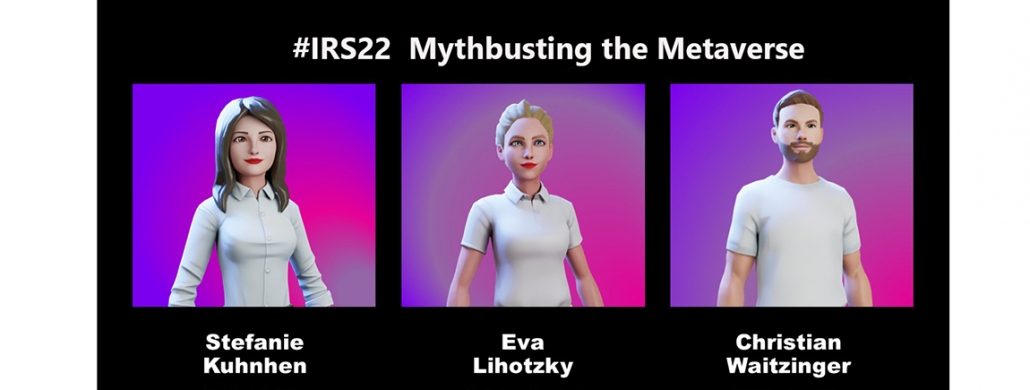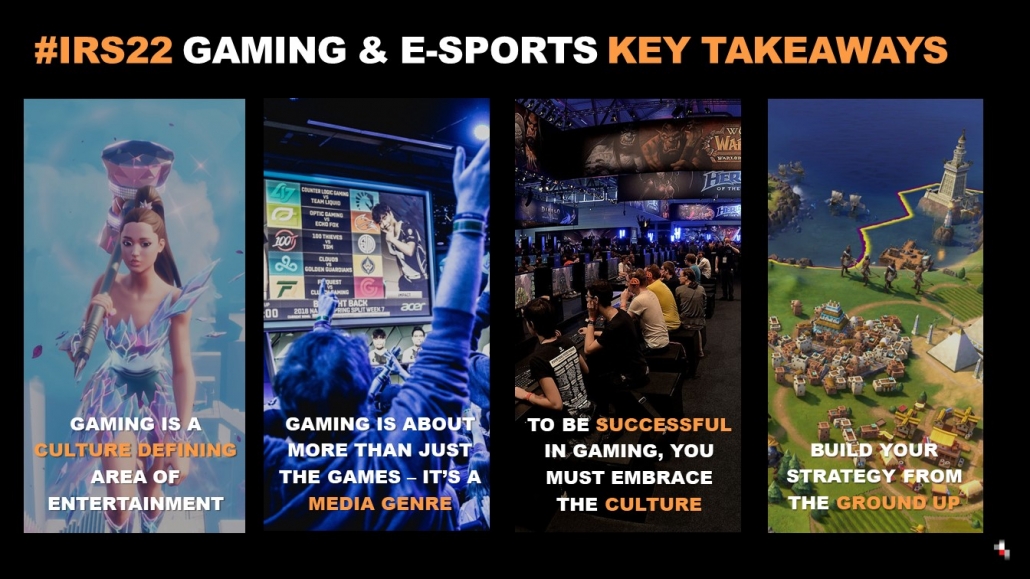Connecting the real and virtual worlds, the metaverse is set to be the next big challenge for marketers. Gaming and e-sports are the drivers of a whole new entertainment industry.
When Facebook founder Mark Zuckerberg announced that the new name of his company was Meta, it was a huge clue to the internet’s next stage of evolution: the metaverse as the next iteration of the World Wide Web as we knew it. After all, virtual and physical worlds are increasingly converging and constantly creating new digital spaces. And one of the main drivers of this are games and the digital world of sports . So, it was only logical that the latest “International Roadshow” by the Serviceplan Group was dedicated to “Mythbusting the Metaverse” – with a particular focus on e-sports and gaming.
People are spending more and more time online, as Eva Simone Lihotzky, Director Group Corporate Strategy Serviceplan Group, is observing. While it was just 7 percent of their day in 2010, it is now around 38 percent – and will soon be 50 percent. “The pandemic has certainly fueled this development, but the third web is already very present. Virtual worlds are becoming mainstream.”

Virtual spaces are now more creative and social
Online gaming platforms like Roblox, where the users invent their own computer games and can play them with others, are proving a huge hit. Like the team-based strategy game League of Legends, which is played by hundreds of millions of players every month and is constantly being developed. “Virtual worlds are becoming more creative and spatial,” Lihotzky says. “And they are also adapting themselves to users’ needs. This consistency is what makes them lasting companions and therefore also so interesting for the brand economy.”
We are currently “in the early stages of a new technology that has outgrown its hype status,” says Stefanie Kuhnhen, Chief Strategy Officer at the Serviceplan Group. In her view, a “learning community” is currently emerging and it is important to now get a foot in the door. “We shouldn’t just be thinking in single platforms anymore. There are lots of different metaverses that are emerging: open and decentralised, no longer just accessible with AR glasses, but more and more browser-based and mobile.” And the focus is not so much on creating 3D-rooms per se, but on creating exiting experiences and hence time that consumers want to spend with a brand. The “15 minutes that a user is spending in branded spaces or new communities can be worth more than the six seconds that they spend looking at an Instagram ad.”
Marketing is reinventing itself in the metaverse
Marketers need to face up to the metaverse in all its complexity. It is a gigantic space for playing, creating things, connecting with others and working, but also for processing transactions, consuming and even earning money. Online gamers and e-sports players are icons of youth culture and influencers in one. Something that hardly seemed conceivable to older generations is now becoming a reality: while the whole family used to sit down to watch TV together for an evening, young people are now tuning into Twitch to watch other online gamers play.
“In the USA, more kids play Fortnite than football and basketball combined,” says Christian Waitzinger, Chief Experience Officer Plan.Net Group, giving us a good idea of the dimensions. In his point of view, the convergence of the digital and physical lifestyle is already fully underway. Brands like Liverpool F.C. have a shop on Roblox, Chipotle has launched the Burrito Builder there and fashion brands like Gucci are also gradually making a foray into the worlds where young people can be found today. It all comes down to being in the place where your future customers spend the most time. And for Waitzinger, it is extremely exciting to see how more and more new business models are emerging from this and brands are rethinking their understanding of consumers.
Gaming is taking over from TV
Gaming has become more unifying across national borders than almost anything else. “Gaming is a sympathy multiplier,” says Alexander Turtschan, Director Digital Accelerator the Mediaplus Group. “E-sports arenas are the new movie theatres.” A way to lose yourself in stories, compete with others and keep on improving. “We see ecosystems emerging here. You can even become a superstar yourself and earn a lot of money. That’s why, e-sports are a serious contender for traditional sports in terms of marketing or sponsorship.” Here you can find everything that the marketer’s heart desires: attractive target groups, influencers, strong communities and, last but not least, the perfect gateway into youth culture.
The advertising industry is merging more and more into these new worlds and its focus now is to create meaningful engagement of lasting value. Nevertheless, “brands should still stick to their values,” believes Helmi Abdalhadi, Manager of House of Gaming at the House of Communication Dubai. He sees gamers as being very critical and professional and, as a result, the only way to reach them is with authenticity. “So, brands that engage with this target group always need to give something back, really embrace the culture and build up something from scratch. We definitely see a new media genre emerging here.

Brands are leading the way in brandification
More and more brands are recognising the momentum of this global movement and are aligning their gaming and e-sports strategies accordingly. “We realised that there are overlaps with our own fundamental brand strategy,” says Pia Schörner, Head of Gaming and Sponsoring at BMW Group. “Joy” or “thrills” are the perfect fit for what the BMW world refers to as its core. So, two and a half years ago, the Munich-based company began making their brand “future-proof for the younger target groups.”
Above all, it was about generating the maximum impact in what Schörner calls “the fastest growing segment of the entertainment industry”. They achieved this with partnerships with the six best e-sports teams in the world, as well as the development of unique formats such as ‘Brawls’, where well-known e-sports players compete against each other. Schörner believes that it’s very important to not just stubbornly throw in product placements, as so many brands do. “For us, it’s about being relevant.” Brandification is the magic word here.
Authentic advertising instead of mere selling
Markus Weiß, Director of Corporate Affairs & Company Spokesperson at McDonald’s Germany, is taking a similar approach. He admits that “McDonald’s isn’t the first brand that springs to mind when talking about something like e-sports”, but they have developed an approach for the new virtual worlds that is valuable and beneficial and goes beyond merely wanting to sell. “As a brand, we want to be an everyday companion that also gives something back and who is as just as passionate as our target group.”
Entering into a partnership with tournament organisers ESL, the world’s leading e-sports company, was not just a first step but is an important pillar of its gaming engagement until today. McDonald’s is meanwhile active at Gamescom, the world’s biggest trade show for video games, and is launching attention-grabbing promotions like the Twitch Sub Bombs (one-off subscription gifts): in this format, which saw them team up with well-known player collective PietSmiet, the burger giant surprised small content creators (micro-streamers) with a ‘gift’. Those watching the PietSmiet broadcast were encouraged to visit the micro-streamers’ pages – sending their total viewing numbers from the low double-digits into the thousands and therefore supporting the micro-streamers financially. “Whenever possible, we rather integrate the brand in a playful way, combined with our messages, instead of playing classic commercials”, explains Weiß. “Our ethos is: brand love meets brand trust.”
Missed the IRS22? If you’d like to watch one of the sessions, the videos are available on our website

